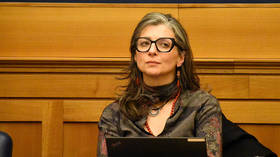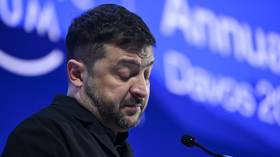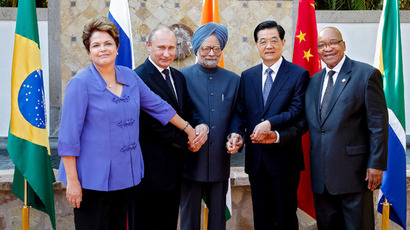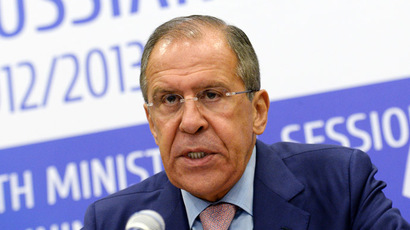West trying to 'flirt' with Islamic front in Syrian crisis - Lavrov to RT
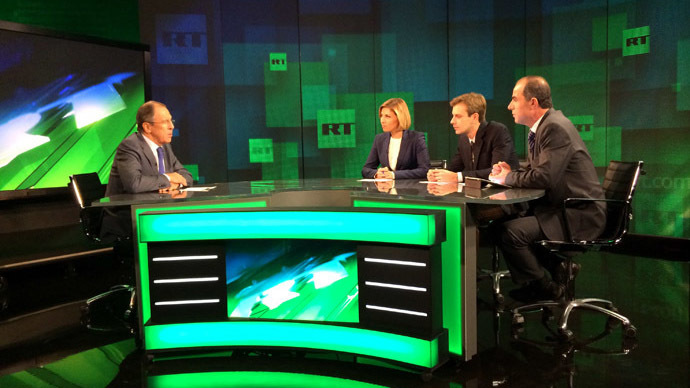
Russian Foreign Minister Sergey Lavrov is worried that Western politicians are still trying to "flirt" with the Islamic front in Syria, although they are beginning to realize that overthrowing Assad’s regime would play into the hands of terrorists.
RT:Hello Mr. Lavrov, and welcome to RT. Thanks for joining us. Today in the studio we have journalists from RT English, RT Arabic, and RT Spanish. If my colleagues don’t mind, I will start. This year has been a landmark year for Russian diplomacy. What is your personal assessment of the arrangements on Syria and Iran? And what do you think are the prospects for the Geneva-2 talks?
Sergey Lavrov: These are very positive agreements, and I believe they were made possible by our joint efforts. This is further proof that initiatives can only be put into action by our joint and sincere efforts that ensure a balance of interests and are in line with international law. I wouldn't go as far as to say we've made a breakthrough this year in terms of Syria and Iran. First, the agreements to destroy the Syrian chemical arsenal and to convene the Geneva-2 conference, as well as the first stage agreement on further steps to resolve the Iran nuclear issue, are the fruit of years-long efforts. At least when it comes to Syria, we're talking about three years of Russia's consistent efforts of defending international law. The same applies to the progress on Iran. For over three years we'd been seeking two things: first, to get all the parties to the talks to agree that eventually Iran should have a recognized right to develop its peaceful nuclear program and enrich uranium to make fuel for nuclear power plants, while making sure that this program has no military dimension and that it is subject to total control of the IAEA, and providing security of all the countries in the region, including Israel.
But it took a very long time for our Western partners to start reasoning this way, the way which is fair, comprehensive and takes into account the interests of the international community – Western countries, the region's and Iran's interests. It also strengthens the nuclear nonproliferation regime. So we have managed to reach this deal right at the end of the outgoing year. Another thing we have been advocating for years is the necessity to draw up some kind of a roadmap (the expression has become a buzzword now) since you can't resolve a conflict overnight. So we suggested moving forward step by step on the basis of reciprocity, which means Iran is to meet the demands set by the IAEA and supported by the UN Security Council, and the international community, in its turn, starts easing sanctions on Iran. It is supposed to continue until Iran has fully complied with all the requirements and that is the moment when all the sanctions will be lifted. For a few years, we have been advocating these two things: the so-called "endgame" — and the procedure of the dialogue, as well as promoting a political settlement in Syria.
So this breakthrough – if it was, indeed, a breakthrough – was the result of Russia’s long-term efforts and patience. When the Arab Spring began, Russia was said to be on the wrong side of history, to have lost the Arab streetand the Middle East. Unfortunately, at the time our Western partners – and some of our partners in the region, by the way – weren’t looking for solutions that would help stabilize the situation and help the nations in the region to implement their right to a better life, but opted for information warfare tactics. I’m just stating the facts – that’s what was happening at that time, and up until the beginning of this year, but I admit that in the end our Western partners have come to important and wise decisions. So the breakthrough was the result of profound groundwork.
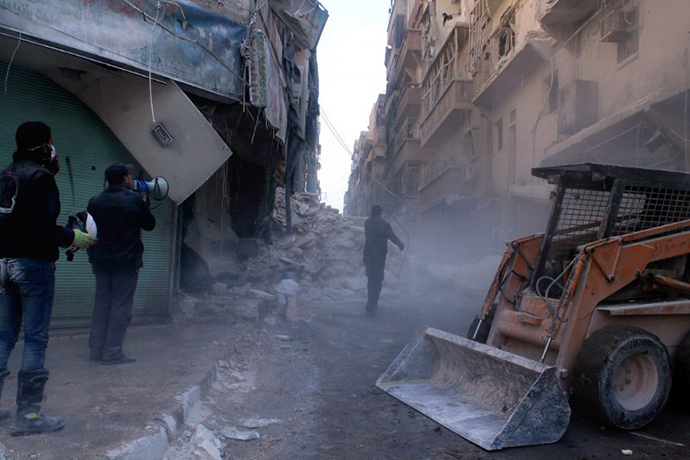
The second reservation about using the word ‘breakthrough’ has to do with the future. The decisions regarding Syria and Iran are far from being fully implemented. As for destroying Syria’s chemical stockpiles, everything is going according to plan, with minor deviations concerning the timeframe of the interim stages, though the reasons for that are objective rather than subjective. I am sure that the deadline for the complete destruction of Syria’s chemical arsenal, June 30, will be met.
As for Geneva-2, we still have a long way to go. We don’t know for sure that this conference will be successful. (We can talk about this in more detail later. I am sure you’ll have more question on this issue.) And as regards the Iranian nuclear program, we’ve only reached an agreement concerning the first phase. We have a detailed plan, and technical experts are currently working on a timeframe which very specifically describes all the steps that Iran and the international community will take reciprocally. But then we need to proceed to the second phase which also needs a detailed plan of mutual steps by both sides, until we reach a point which we may call final. So now we are at the intermediate stage. A lot has been done, but it’s still early to celebrate. There’s a lot of hard work ahead of us. So instead of celebrating we should be thinking how to bring these two extremely important processes to completion.
RT:Let’s stay on Syria and countries which have had Arab Spring revolutions. Could you please elaborate on the balance between democracy and security? How difficult this problem is? What lessons can we learn from Arab Spring revolutions? What dangers is this region facing today in terms of terrorism?
SL: I think more and more countries today embrace democracy as their way of organizing society and structuring their state. Russia made this choice a long time ago. It is our clear choice, and it can't be revised. We are convinced that democracy is the way the world and every country should follow, but we are also convinced that it is up to each nation to choose a specific model of democratic development and democratic institutions. Every country has to make that choice taking into account its traditions, history, and values. Yes, there are some universal criteria that have been adopted by all. I am talking about things like the UN Charter, the Universal Declaration of Human Rights signed by all UN member states. But when, in addition to the universally accepted principles, certain countries seek to impose their own system of somewhat controversial values which have only been around for the past couple of decades, insisting on them as universal obligations, this leads to conflicts and causes certain nations to interfere with the internal affairs of other countries, imposing their model of democracy on others. This is no longer democracy. This kind of forced “democratization” result in instability. This happened when Americans invaded Iraq; this happened recently, when NATO blatantly overstepped the UN Security Council mandate and bombed Libya; and this kind of external intervention is also happening in a number of other countries in the region. The Syrian conflict is another example of a situation where you have terrorists from all over the world, including Europe, US and Russia, fight there to turn Syria, and in fact this whole region, into a caliphate. So, forced democratization by outside forces undermines stability and produces new threats. Greater stability, on the other hand, provides the best environment for democratic reforms.
So, when the conference on Syria opens (and I really hope that the conference will go ahead as planned on January 22; I hope the opposition does not come up with some unacceptable conditions contrary to the Russian-American initiative), I strongly believe this conference should focus on fighting terrorism as this is the main threat to Syria and other countries in the region today. Certainly, there will be other issues on the agenda, including pressing humanitarian issues, discussions on the political process, organizing the elections, provisional institutions for the transitional period, but all this should be based on a common understanding between the government and the opposition, just the way it was captured in the Geneva communiqué produced at the first Geneva conference.
So, I really hope that our Western partners and our partners in the region, which have more influence on the opposition than anybody else, will make sure, firstly, that the opposition is properly represented at this conference and, secondly, that the opposition attends the conference without any preconditions. The very point of the Russian-American initiative is that the people of Syria should agree on how to implement the principles captured in the Geneva communiqué of June 30, 2013, without any external intervention or any preconditions. But so far, unfortunately, we don’t know what the regime's opponents, who have recently formed the National Coalition, will do. We are alarmed by the fact that the National Coalition does not seem to have complete unity. We are also alarmed by the fact that the National Coalition keeps saying that this conference must result in a regime change, or even that a regime change is a prerequisite for having the conference. This is something we have never agreed to. We are also alarmed by the fact that the National Coalition does not seem to have complete control over all the groups fighting the regime on the ground. Another concern is that we see among the rebels an increasing number of jihadists who pursue extremist objectives. They want to set up a caliphate and impose sharia laws, and basically they are already terrorizing minorities.
They have formed what they call an Islamic Front, and some of our partners in the West are even flirting with it – even though we know from our confidential contacts with them that they know pretty well that the organizations which formed the Islamic Front are not much different from Jabhat al-Nusra, or the Islamic State of Iraq and the Levant. This alarms us.
Incidents of anti-Christian violence are happening time after time. Before the crisis, there were two million Christians living in Syria. Now there’s probably less than a million left. We don’t have reliable statistics, but I believe at least a million Christians are now refugees. We all know about the most outrageous incidents, and your channel covered some of them. There was an incident at St. Thecla Convent when nuns were taken hostage by terrorists. This incident happened near the town of Maaloula, the only place in the world where people still speak Aramaic, the language of Jesus Christ. We know from our contacts with Christian communities in Syria and throughout the region that they are very worried, because Christians have been living in the Middle East for two thousand years, and now all this can be over. So, first of all, it is necessary to come to an agreement on what the future Syria should be like. Fighting terrorism is the number one priority. As far as the political process is concerned, the government and the opposition should first of all put on paper their common vision of Syria’s future – that Syria should be a sovereign, independent country whose territorial integrity is universally recognized and where the rights of all the ethnic, religious and political groups are respected so they all feel secure and they are all involved in in the political process. Who should be in the government, on the other hand, and who should organize the elections – these matters are secondary. The biggest threat comes today from those who seek to defeat the government on the battlefield and set up a totally different state.
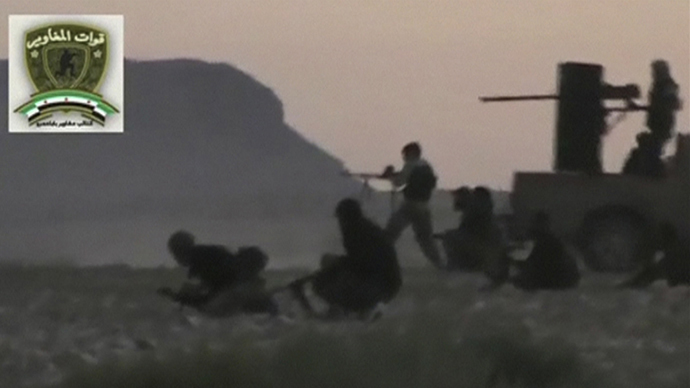
Of course, the humanitarian situation worries us as well, and perhaps we do more than anybody else to address these problems by working together with the government and UN agencies. We are making progress, although it is a difficult job. After all, there is real war going on in a large part of the country. We help both directly, by sending humanitarian cargo like medicine, food and other things, and indirectly, by making donations to various UN humanitarian agencies and the International Committee of the Red Cross.
But some people are trying to take advantage of this humanitarian crisis for their own purposes, just like they did with the chemical weapons. They get extremely emotional on this issue, and, like they did with the chemical weapons, they blame the government for everything, including the humanitarian crisis. They had the UN General Assembly adopt a resolution which gives a completely distorted picture of what is actually happening on the ground. This resolution is extremely ideologized. At least, a much smaller number of nations supported this resolution compared to a similar resolution adopted a year earlier. Now they say they will send what they call a “humanitarian” resolution to the UN Security Council. This resolution will demand that the government should take certain steps unilaterally and threaten the government with actions based on Chapter 7 of the UN Charter. This plan has no future. What worries us is that we see increased activity on the part of the people who come up with such spoilers before the Geneva-2 conference. The opposition says they will only take part in the conference if their various demands are met. Sometimes they insist on a regime change; sometimes they say they need guarantees that there will be a regime change immediately after the conference; sometimes they say they will only take part in the Geneva conference after the humanitarian crisis is taken care of. But in reality the humanitarian crisis gets worse mostly because of the militants, because of the groups which many countries have officially recognized as extremist and terrorist. So, we do need to address humanitarian issues, but instead of fighting symptoms we should fight the root cause of the crisis. And the root cause of the crisis is that the terrorist threat is extremely serious in Syria today, and the government and the opposition should come to an agreement on the key parameters regarding the future of their country, like I said earlier.
By the way, I should also mention that at the G8 summit in Lough Erne in June, all the leaders of the G8 countries urged both the Syrian government and the opposition in their communique to join their forces in fighting terrorists in order to defeat those terrorists and drive them out of Syria. This, I believe, is our top priority today. Once the situation stabilizes, once the rights of all minorities are secured, once the multi-ethnic and multi-faith nature of the Syrian state is secured, democratic institutions will follow. Stability is the number one priority today.
RT:Mr. Lavrov, I would like to ask you about Latin America, which is becoming increasingly attractive for many countries - including Russia. But China is also very active in the region. What’s more, the Chinese are showing interest in the same areas as Russia – transport, mining, and arms exports. How will the interests of Russia and China co-exist in the region? Would you describe the situation between Russia and China in Latin America as competition?
SL: If a certain country in Latin America announces a tender for the construction of a hydro power plant, or a railroad, or a highway, or an industrial facility, and there are companies from both Russia and China interested in taking part in this tender, I guess you can call them competitors. But this is what you may call the practical dimension of cooperation between Latin America and their international partners. At the conceptual level, I can say that when we make friends with other nations, our friendship is never against anyone. We want every country to have diverse, equal, and mutually beneficial ties with all the countries who would like to do the same. This is part of our foreign policy concept. We call it being multidirectional. As equal partners, taking into account each other’s interests, we are open to cooperate with anybody who wants the same. In the modern world, where Russia, China, and many other countries are becoming stronger economically, and where Russian and Chinese companies have capabilities and ambitions to compete for promising markets, of course Latin America is an immensely interesting region. It is rapidly developing. It is a region that seeks to play an increasingly independent role, and we appreciate that - because few countries around the world today can afford to be independent.
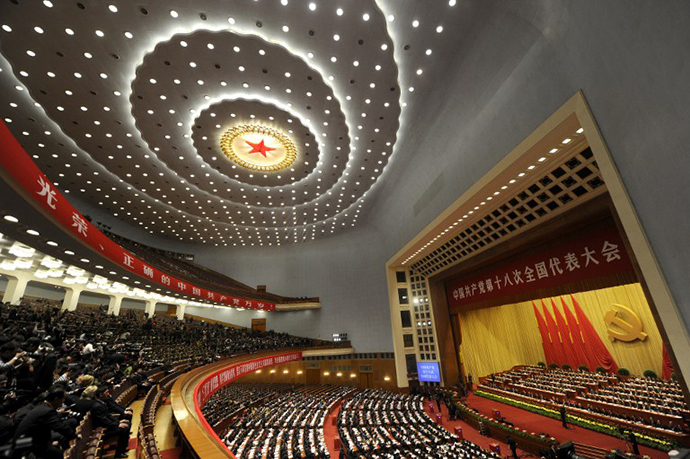
Also, Latin America is definitely becoming a center of economic growth, financial power, and political influence. It is one of the poles in the emerging multi-polar world order. It is a very promising region. Politically speaking, Latin American countries share an approach which is very similar to Russia’s – and, incidentally, China’s – position on various international affairs. What I mean is respect for international law, recognition of the central role of the United Nations, non-use of force for conflict and crisis resolution, the use of political and diplomatic means to resolve various international issues, etc. This is what we have in common. Of course, this political proximity is a good foundation for developing further our economic and cultural contacts. We have a visa-free travel regime with all the countries in Latin America and the Caribbean (just to be on the safe side, I should probably add that possibly there are a few exceptions). This is an important indicator of mutual trust and an important instrument for developing trade, investment, tourism, and general contacts between people. We live in a globalized world, and we are happy that Latin America attracts more and more serious partners.
RT:Russia is often portrayed abroad as a country that tends to act rashly, even though Russia’s foreign policy is anything but rash. Would you say that Cold War clichés are still a major influence in international affairs today?
SL: I agree that attempts to portray our actions as rash and emotional have nothing to do with reality. This may be part of the information war I mentioned earlier. If you look at what we did with Syria and Iran, for example, you will get a totally different picture. We are always pragmatic and flexible. We never corner ourselves, like some did more than two years ago when they said that Assad was no longer legitimate and did not represent anyone. This was a hasty and emotional statement by some of the world leaders. How can you say that he doesn’t represent anybody while in reality he’s backed by a significant portion of the population, if not the majority, due to a number of reasons. It’s not because he is vastly adored by the people, but because a lot of people depend on him. It’s not just the minorities, a lot of Sunni depend on him. Whatever you might think of it, many of them have successfully run their businesses during the rule of the Assad family. They are convinced that in the case of a violent regime change, without any political settlement, their businesses might be taken away from them. So Assad does represent a significant portion of the population, and statements like ‘he’s not legitimate’ or ‘you can write him off’ is a prime example of hasty and premature decisions. Syria inevitable comes to mind no matter what issues we are talking about today. Currently, the attitude of the West is different, they are becoming increasingly realistic in their approaches towards the settlement of the Syrian crisis. Whatever the official spokesmen say, number one problem is the threat of terrorism, the threat of jihadists coming to power in Syria and establishing a Caliphate with an extremist order, the threat of undermining the rights of or even exterminating the Syrian minorities. Our Western partners are becoming increasingly aware that regime change is not a solution – quite the opposite, regime change can make it easier for the terrorists to come to power. So, hopefully, our Western partners will do whatever it takes to convene the Geneva-2 conference. We’ve done our share. The Syrian government has picked its delegates, the opposition has not done it yet. So I do hope that as the understanding of the situation in Syria and the region sinks in, our partners will work hard to complete their part of the job in a way that we’ve earlier agreed on.
Talking of Russian foreign policy in general, we have an official concept that outlines its key principles – we pursue relations with other countries that are equal, pragmatic, and mutually beneficial. We will defend our legitimate national interests in a determined and consistent way but without engaging in any confrontation. In his annual address to the Federal Assembly, Russian President Vladimir Putin clearly re-affirmed our policy. In particular, he said that Russia doesn’t claim to be a superpower on the global arena, Russia doesn’t want to lecture anyone. But Russia wants to be a leader in promoting international law and the principles that are enshrined in the UN Charter.
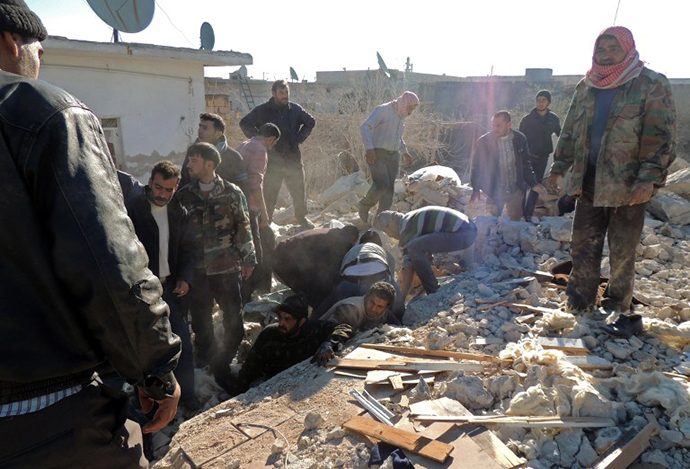
Patience is required to achieve success in international affairs, to resolve crises like the Syrian or the Iranian one. I’m sorry; it’s a bit of an exaggeration to call the situation around Iran a crisis. But I can also refer to the Middle East in general or the Israeli-Palestinian issue. We are promoting a pragmatic approach in the Israeli-Palestinian conflict, an approach that rules out any unexpected or unilateral steps that undermine confidence. This conflict is a good example to explain one more important rule. You can be vocal in defending certain principles in public, but it’s much more important to put them into action in a consistent way. Take the intensive work done by the Quartet of international mediators on the Israeli-Palestinian conflict, including Russia, the EU, the US and the UN. There were regular meetings of experts and ministers who drafted some blueprints with principles offered to Israel and Palestine as the basis for launching direct talks. We worked together with the Arab League, and we still want to do that. But then there was a break at a certain stage. Not all members of the Quartet were prepared to move forward at the same pace and in the same consistent fashion to convince the two conflicting parties to use the principles to settle the longest-standing conflict in modern history. So it’s wrong both to take steps in a hurry and to make a pause in your efforts, to lose sight of the progress that was achieved.
The current Obama administration, I mean US Secretary of State John Kerry, with whom I have close contacts, is taking their own unilateral steps to facilitate direct talks. We support these efforts. But I am sure that eventually - just like with Syria, Iran, Afghanistan, or Iraq - unilateral efforts are not sufficient. You need to rely on joint efforts, on ideas that are worked out together. Two heads are better than one anyway. We have several multilateral formats like the Quartet or the P5+1 group on the Iranian nuclear program. We have a format on Afghanistan and on Yemen. A conference on Libya is upcoming next year. Our cooperation within these formats is never smooth, but these represent our joint efforts. Any proposals that Russia might come up with are usually promoted via these formats. We first need to win broad support from the other stakeholders and then propose to the conflicting parties a plan that would be universally accepted.
So there’s no haste in the decisions that Russia takes in its foreign policy and I hope our partners wouldn’t be tempted to resolve any issues overnight – otherwise it could be harmful.
RT:Let’s talk about Russian neighbors. Recently, we’ve been hearing anti-Russian rhetoric in Ukraine and some other post-Soviet countries. Don’t you think it’s happening too often?
SL: It’s sad that we still see these things happening, so many years after the end of the Cold War. The main antagonists who contributed to this coldness in the world are no longer there, at the Soviet Union and the Warsaw Pact are gone, unlike NATO. It’s not constructive to rely on the phobias of the bygone era. It’s a short-sighted policy. Our goal is to live with all our neighbors in peace. We used to live as part of one state together with them, including the Baltic states. It was thanks to our joint efforts that these countries have robust production, the industries that drive the economic growth and infrastructure.
As the Soviet Union was collapsing, our Western partners told us that Latvia, Lithuania and Estonia had a lot of phobias regarding the past and that once they were members of NATO, they would feel secure.
It never happened that way. True, we are developing economic and cultural ties with these countries and we want to see them strengthening but when they get together at a NATO summit, we hear them voicing Russian phobias. Here’s an example. We have a discussion platform called the Russia-NATO Council in place where we debate many issues, including the missile shield, of course, which is the main stumbling block in our relations with the US. We’ve talked about that issue at length. We want the Russia-NATO Council to be a confidence-building tool. Confidence is what we desperately need in the Euro-Atlantic. The level and the volume of our economic, humanitarian, educational, and scientific ties with Europe is huge and is growing every year. It’s a striking contrast to the low level of trust in terms of politics and defense. To improve that, we’ve been suggesting sharing information on different aspects, advocating transparency on military exercises that are taking place near our respective borders. During my visit to Poland, my counterpart has expressed satisfaction with the level of transparency regarding the recent drills West 2013.
Later NATO held the Steadfast Jazz 2013 exercise on the territory of Poland and the Baltic states. But unlike West 2013, which focused on combating terrorism, Steadfast Jazz followed the procedures outlined in Article 5 of the Washington Treaty, which is all about collective defense.
Even in the run-up to the exercise, we asked our NATO partners who they were supposed to be defending against. It’s a relevant question since the drills were to take place near our borders with the Baltic States and Poland. We didn’t get any coherent reply. But once the exercise was over, Poland and the Baltic States announced that the exercise had demonstrated that the alliance was capable of defending their countries from a threat from the east.
So yes indeed, we still see these phobias, which is very sad. We were open about our concerns at the latest ministerial session of the Russia-NATO Council. Driven by these phobias, some in Europe want to maintain these dividing lines and even move them closer to the east, to view anything happening on our huge Eurasian continent as if it were the zero sum game. You mentioned Ukraine. Well, any attempts to start a geopolitical battle over Ukraine can have disastrous consequences, both for Ukraine and for Europe. This runs counter to modern aspirations of Europe or the goals set by outstanding European leaders; I mean Charles de Gaulle, who spoke of the common space between the Atlantic and the Urals. What Russia proposes right now is a common economic and humanitarian space between Lisbon and Vladivostok. This idea, voiced by President Putin, has not been rejected. Furthermore, the president of the European Commission, Jose Manuel Barroso, voiced a similar idea. So why then is it still on paper? Why do we hear these ideas but in reality we see completely different strategies being played out? We now see that responsible European politicians have changed their view on Ukraine after the current crisis. Previously, their key message was that Ukraine had to make a free choice in favor of the Association Agreement with the EU. Right now, they’ve come to realize the importance of the fact that Ukraine has a unique position between eastern and western neighbors; that it has vast economic ties with both east and west, and that you need to be looking for solutions which take into account the complexity of all these factors. One of them is holding trilateral talks between Ukraine, Russia and the EU - the idea voiced by Ukrainian Prime Minister Nikolay Azarov right in the heat of the crisis and supported by President Putin. The president is aware that both Ukraine and the EU have their unique interests, but we don’t want our interests to be undermined. But back then, the EU officials rejected this idea. Today, the German leadership, including Chancellor Angel Merkel and Foreign Minister Frank-Walter Steinmeier, say that you need to factor in the realities and look for ways of cooperation that would be beneficial and acceptable for all the parties. I can only welcome statements like this.
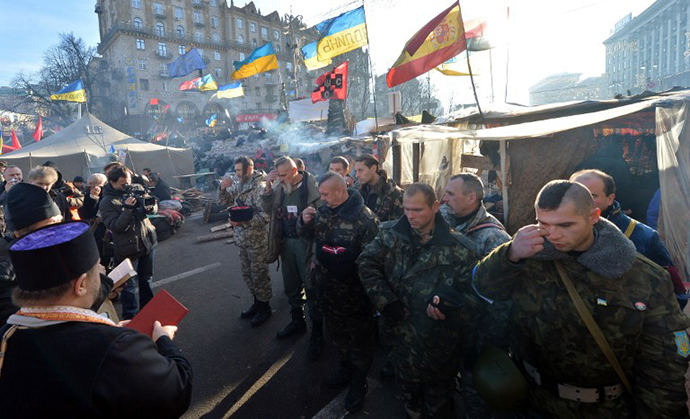
So we need to get rid of these phobias. Of course, old habits die hard. But I think that responsible European politicians should help the EU to build a policy that will take into account the legitimate interests of Russia, Ukraine, and other post-Soviet countries. As we build such an environment at the political level, with the Eurasian integration gaining ground and increasing our competitiveness in industry, agriculture, and innovations, we will be better prepared to talk as equals on further liberalization of trade and investment regimes between Russia, our neighbors and the European Union and push for it on more favorable terms. In other words, we'll be taking practical steps to make our dream come true and build a common economic and humanitarian space from the Atlantic to the Pacific.
RT:Mr. Lavrov, we've talked about Syria and Iran. But this year was certainly marked by a tremendous scandal over the US spying on both ordinary citizens and world leaders. Do you think the international community's response to Edward Snowden's revelations has been sufficient? And has it affected America's global influence?
SL: President Putin talked about this at his recent major press conference. He said he hoped that the primary objective of the US special services is combating terrorism and preventing terrorist attacks. This is our common goal, and we're interested in bringing the entire international community together in the UN and other institutions in the most efficient way to tackle the threat of terrorism.
Speaking of Edward Snowden, I doubt anyone was shocked by the actual content of his revelations. Rather, the shock came from making the whole thing public; from leaking facts that are traditionally swept under the carpet. The response, I believe, was pretty predictable. Who would take kindly to something like this, after all?
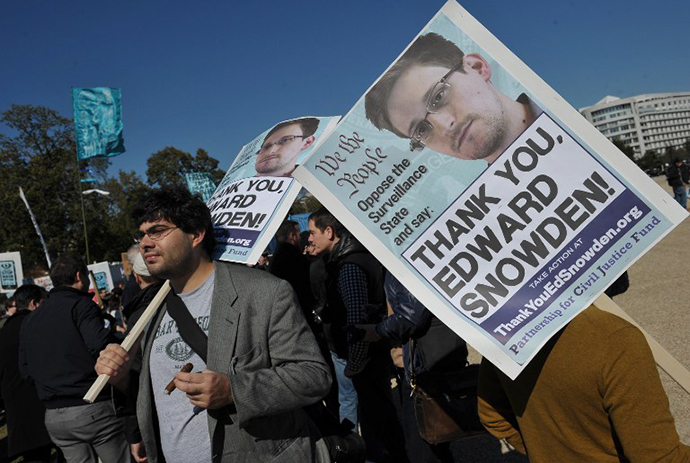
As to the practical steps taken by the international community, the UN General Assembly voted unanimously for a resolution that condemns such privacy infringement. In fact, a few years ago we suggested that the Organization for Security and Cooperation (OSCE) in Europe should adopt a resolution against the abuse of the internet, stating primarily that intrusion into private lives is unacceptable. But their response was negative.
By the way, at the OSCE ministerial session in early December we brought up this question once again, telling the OSCE that the decision they refused to adopt a few years ago has now been taken aboard by the UN General Assembly. In other words, the OSCE, which considers itself a trendsetter, suddenly found itself lagging behind.
The most important thing to do now is to learn the lesson. We’ve heard that President Obama has given instructions to draft documents against abuse by intelligence services. We are also convinced that this problem calls for additional attention in terms of a systemic approach to cooperation.
Now, I’ve mentioned one aspect to this problem, which is the abuse of the internet in terms of privacy infringement. But for a few years running, there’s been another issue in the spotlight, and that is managing the internet. The International Telecommunication Union is heavily discussing ways to prevent the web from becoming a tool to promote someone’s unilateral interests. This is a complex issue. I won’t go into detail – you surely do understand what it’s all about. But I believe that having this topic on the agenda is a serious message.
Russia is also actively sponsoring several related initiatives together with its partners in the Shanghai Cooperation Organization. We have introduced a draft document regulating international information security in the UN. We suggested to our NATO partners that we should have a special mechanism for cyber-security inside the Russia-NATO Council. However, NATO has so far rejected this proposal – which, I believe, is to a large extent because some of the NATO members are still influenced by their old phobias. But we’ve been able to establish a bilateral working group on international cyber-security as part of a larger presidential commission. Our initial contacts in this working group have confirmed that the US does understand the need to introduce regulation in this area and to prevent the internet from becoming a tool for terrorists and other criminals to promote child pornography and many other crimes that are totally unacceptable and that are now almost entirely unregulated.
RT:The issue of whether Iran should be invited to the Geneva-2 conference has been a stumbling block. The West continues to insist that Iran shouldn’t join. Do you think this conference can take place without Iran?
SL: The matter hasn’t been settled yet. If you look at the list of participants that is currently being negotiated, Iran has parentheses around it. We are convinced that all the countries that influence the situation should take part in the conference. In this case, it’s first and foremost all of Syria’s neighbors and other key players, especially Iran and Saudi Arabia. These two countries are linked to a very serious threat. I am talking about the brewing conflict within Islam between the Sunni and the Shia. We can’t allow this to happen. By the way, there are tensions even inside Sunni Islam right now, and that’s very dangerous. That’s why Saudi Arabia (as the home of two Muslim holy sites and a predominantly Sunni country that openly declares its interest in removing the Assad regime) and Iran (which aspires to be the leader of the Shia world and openly declares its interest in preserving the current regime and finding a political solution) should both be present at the conference. They will influence the situation anyway, so it would be much better to include them in the general discussion and have them listen to the opinions of all the participants - especially the Syrian government and the opposition - but also other countries supporting different parties to the conflict. Pretending that they have no influence would be non-pragmatic. That’s an ideologized approach that harms the process.
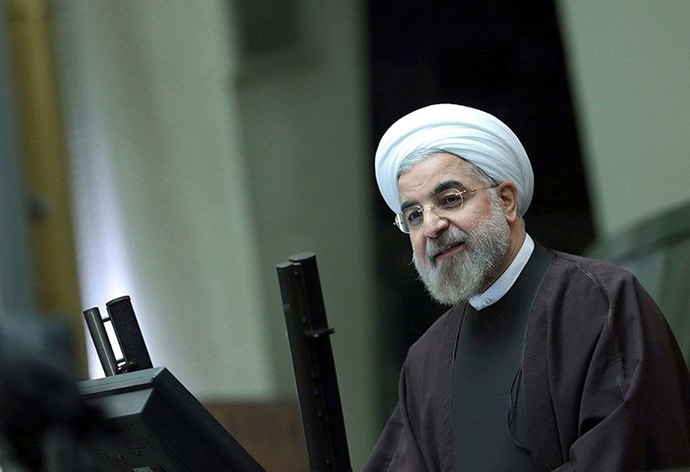
Some say that Iran is counterproductive and that it hasn’t signed last year’s Geneva communiqué, which is the basis for the Geneva-2 talks. But some of the countries whose participation in the conference the West does not oppose are not only in disagreement with the Geneva communiqué provisions, but are basically obstructing the convention of Geneva-2. Everyone is fully aware of that. So it’s obvious to us that Iran should participate in the conference, and in fact it is obvious to pretty much everyone else; the European countries are in favor of it, the Arab countries support it, and the UN Secretary General and his special envoy Lakhdar Brahimi support it as well. The US still has some reservations, but there’s some time left, and we’ll be discussing this matter further. After all, in the past, when the US had its own problems to solve in Iraq or Afghanistan, Washington established direct contacts with Iran without a second thought - ideology or no ideology. So if this was possible when there were American interests involved, why not sit down to talk with Iran when it concerns Syria’s interests? When the Taliban ruled Afghanistan, we had a 6+2 group – Afghanistan’s six neighbors plus Russia and the US. Iran was part of that group and proved capable of working in a multi-party format as part of the solution rather than part of the problem.RT: Thank you very much, Mr. Lavrov, for this interview.
SL: Thank you.



